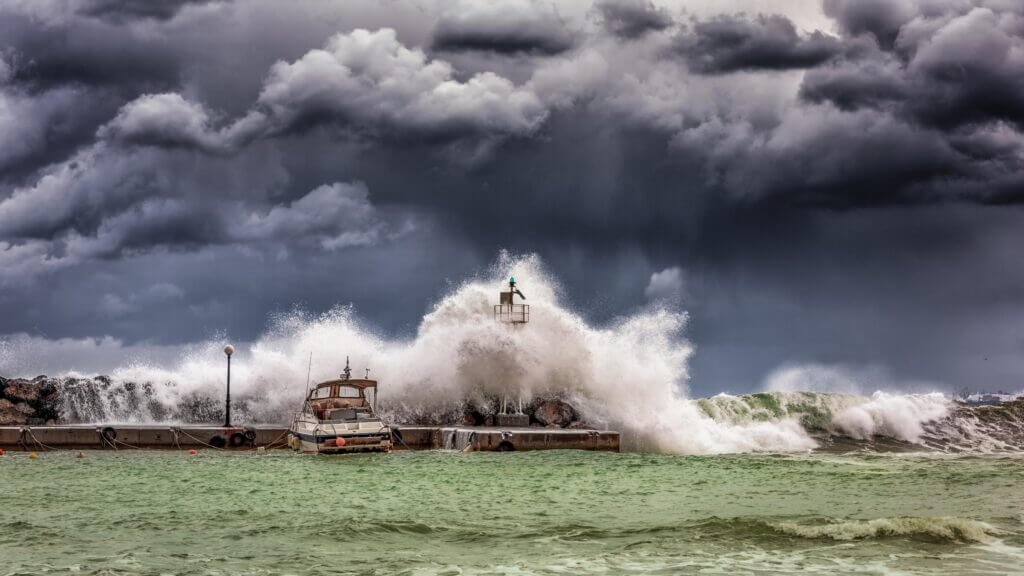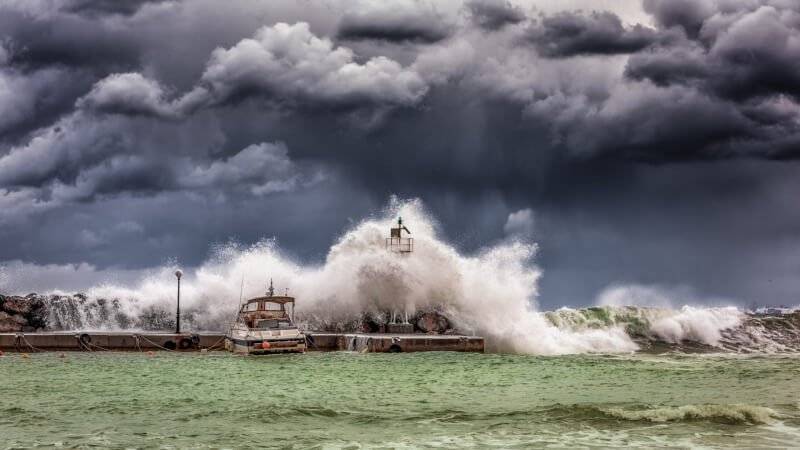Living in coastal Florida, you may be wondering how you can effectively prepare for the upcoming hurricane season. With the potential for severe storms and their devastating impact, it’s crucial to have a plan in place to safeguard yourself, your loved ones, and your property. From creating an emergency kit to securing your home, this article will provide you with valuable tips and strategies to ensure your preparedness. So, let’s get started on ensuring your safety and peace of mind during hurricane season in coastal Florida.

Creating an Emergency Plan
Identify evacuation routes
When preparing for hurricane season in coastal Florida, it is crucial to identify the evacuation routes in your area. Familiarize yourself with the designated routes and make note of any changes or updates from local authorities. Knowing these routes will help you and your family navigate safely to a secure location, should evacuation become necessary.
Choose a safe meeting spot
In the event of an evacuation, it is important to have a designated meeting spot where you and your family can reunite. This spot should be away from coastal areas and flood-prone zones. Choose a location that is easily accessible and known to all family members. This will ensure that everyone knows where to go and can quickly regroup during the chaos of evacuation.
Designate an out-of-town contact
During a hurricane, communication systems can become overwhelmed or damaged, making it difficult to reach loved ones. Designating an out-of-town contact person is an important step in staying connected with family members and friends. Choose someone who is geographically distant from the affected area, as they are less likely to be impacted by the storm. Share their contact information with everyone in your household, so that you can all communicate and provide updates on your safety and whereabouts.
Prepare essential documents
As part of your emergency plan, it is crucial to prepare and protect essential documents. Gather important papers such as identification documents, insurance policies, medical records, and property deeds. Place them in a waterproof and fireproof container to ensure their safety during a hurricane. It is also advisable to make digital copies of these documents and store them securely on a cloud-based storage platform or a password-protected external drive.
Create a disaster supply kit
Putting together a disaster supply kit well in advance of hurricane season is essential for your safety and well-being. This kit should include non-perishable food items, bottled water, a manual can opener, batteries, a battery-powered radio, flashlights, a first aid kit, personal hygiene items, a whistle, a wrench or pliers (for turning off utilities), cash, copies of important documents, and any necessary medications or medical supplies. Store your disaster supply kit in a portable container, making it readily accessible during an emergency.
Securing Your Property
Inspect and reinforce your home
Before hurricane season begins, it is important to inspect your home for any potential vulnerabilities or areas that require reinforcement. Check your roof for loose or damaged shingles, secure loose siding, and reinforce doors and windows. Consider consulting a professional for a thorough assessment of your property and to recommend any necessary modifications or repairs.
Install storm shutters or plywood
Installing storm shutters or plywood over your windows is an effective way to protect your home during a hurricane. They serve as a barrier against flying debris and high winds, reducing the risk of shattered windows and potential damage to your property. Be sure to measure and purchase the necessary materials well in advance, as supplies may become limited during a storm.
Trim tree branches
One potential danger during a hurricane is falling tree branches or uprooted trees. Assess the trees surrounding your property and trim any overhanging branches that could potentially fall and cause damage. It is best to consult a professional tree trimmer or arborist for this task to ensure the safety of both you and the tree.
Secure loose outdoor items
Outdoor furniture, garden tools, and other loose items can become hazardous projectiles during strong winds. Secure or store these items safely to prevent them from causing damage to your property or neighboring homes. Anchor down larger items, such as grills or trampolines, to prevent them from being swept away by high winds.
Check your insurance coverage
Review your homeowner’s insurance policy to ensure that it provides adequate coverage for potential hurricane damage. Make note of any exclusions or limitations, and consider adding additional coverage, such as flood insurance, if necessary. It is also important to document your belongings and keep a record of your home’s contents, as this will be valuable in the event you need to file a claim.

Preparing Your Family
Stay informed about hurricane updates
Staying informed about hurricane updates is crucial for the safety of you and your family. Monitor local news channels, weather websites, and official government sources for the latest information on the storm’s path, intensity, and potential impact. Pay attention to evacuation orders and heed the advice of local authorities.
Develop a communication plan
Having a communication plan in place is vital for keeping your family connected and informed during a hurricane. Determine how you will communicate with each other if cell phone service or internet connectivity is disrupted. Establish a primary and alternate method of communication, such as text messages or a designated family member who acts as a point of contact. Ensure that everyone in your household knows the plan and has the necessary contact information.
Check on neighbors and friends
During hurricane season, it is important to remember that you are part of a community. Check on your neighbors, particularly those who are elderly, disabled, or may need assistance during an emergency. Offer support and check if they have their own emergency plans and supplies in place. Together, we can ensure the safety and well-being of everyone in our community.
Teach your family about hurricane safety
Educating your family about hurricane safety is an important component of being prepared. Teach them about the potential hazards of hurricanes, such as strong winds, flooding, and power outages. Show them how to safely secure outdoor items, explain the importance of staying indoors during the storm, and teach them how to shut off utilities if necessary. Encourage open discussions about their feelings and concerns, and reassure them that you are taking steps to keep them safe.
Plan for your pets
When preparing for a hurricane, it is essential to include your pets in your emergency plans. Ensure that you have enough food, water, medications, and pet supplies to last several days. Keep your pets’ identification tags up to date and have a secure carrier or leash handy. Familiarize yourself with pet-friendly evacuation shelters or hotels in case you and your pet need to evacuate. It is advisable to have a plan in place for pet care if you are unable to bring them with you during an evacuation.
Gathering Essential Supplies
Non-perishable food and water
As part of your hurricane preparedness efforts, stock up on non-perishable food items and an ample supply of bottled water. Aim to have enough food to last your household at least three to seven days. Choose nutritious options such as canned fruits and vegetables, protein bars, and peanut butter. Remember to regularly check expiration dates and rotate your stock to ensure freshness.
Medication and first aid supplies
If you or any members of your household require prescription medications, it is vital to have an adequate supply on hand. Make sure to refill prescriptions in advance of hurricane season and store them in a waterproof container. Additionally, assemble a first aid kit that includes bandages, antiseptic ointments, over-the-counter medications, and any necessary medical supplies or equipment.
Battery-powered radio and flashlights
During a hurricane, power outages are common. Be prepared by having a battery-powered radio and extra batteries on hand to stay informed about the latest updates and news. Flashlights, with extra batteries as well, are essential for navigating your home during power outages. Avoid using candles, as they can pose a fire risk.
Backup power source
Consider investing in a backup power source, such as a portable generator or solar power system. This can provide electricity to essential appliances and medical equipment during a prolonged power outage. However, be sure to follow all safety guidelines and precautions when using generators to minimize the risk of carbon monoxide poisoning or electrical hazards.
Cash and important documents
It is advisable to keep a supply of cash on hand, as ATMs and credit card machines may not be operational during a hurricane or its aftermath. In addition to cash, keep copies of important documents, such as identification cards, insurance policies, and medical records, in a waterproof container. These documents are crucial for insurance claims or other important transactions that may arise during or after the storm.

Creating a Go Bag
Clothing and personal items
When preparing for a hurricane, it is important to have a go bag packed and ready for each member of your household. Include a change of clothing, extra socks and undergarments, sturdy shoes, and comfortable clothing suitable for varying weather conditions. Pack personal hygiene items such as toothbrushes, toothpaste, soap, and toilet paper.
Important documents
Include copies of important documents in your go bag, such as identification cards, insurance policies, medical records, and contact information. Place them in a waterproof bag or use protective sleeves to keep them safe from water damage. It is also wise to have a USB drive or external hard drive with digital copies of these documents.
Basic tools and supplies
Having basic tools and supplies in your go bag can be helpful in various situations. Include items such as a multi-tool, duct tape, a whistle, a flashlight, spare batteries, a small fire extinguisher, and a can opener. These tools can come in handy for repairs, signaling for help, or opening canned food.
Emergency contact information
Ensure that you have a list of emergency contact numbers readily available in your go bag. Include numbers for local authorities, your designated out-of-town contact person, family members, and any other important contacts. Having this information easily accessible will aid in communication and help you maintain contact with loved ones during a hurricane.
Snacks and entertainment for children
If you have children, it is important to include snacks and entertainment in your go bag to keep them occupied and comfortable during an evacuation. Pack non-perishable snacks, juice boxes, and comfort items such as stuffed animals or blankets. Include activities such as coloring books, small toys, or playing cards to help distract and entertain them during what can be a stressful time.
Preparing Your Car
Keep your gas tank full
Before hurricane season begins, ensure that your car’s gas tank is always kept at least half full. Gas stations may become crowded or face shortages during an evacuation, so having a full tank beforehand will help you avoid the potential stress and delays of searching for fuel during an emergency.
Gather car emergency supplies
Put together a car emergency kit specifically for your vehicle. Include items such as jumper cables, a spare tire, a jack, a tire iron, basic tools, a flashlight, extra batteries, a first aid kit, and a blanket. It is also recommended to carry a road map, as GPS systems may be unreliable during a hurricane.
Know your evacuation route
Familiarize yourself with the designated evacuation routes in your area. Plan your route in advance and make note of any changes or updates from local authorities. Consider using a GPS or navigation app to stay updated on real-time traffic conditions and road closures during an evacuation.
Get your car checked
Before hurricane season arrives, schedule a comprehensive check-up for your car at a trusted mechanic. Ensure that all essential systems, such as brakes, tires, and battery, are in good working order. Regular maintenance can help prevent unexpected breakdowns and ensure your vehicle is ready for any potential emergency.
Plan for alternative transportation
In the event that your car is not accessible or cannot be used during a hurricane, it is vital to have a plan for alternative transportation. Explore public transportation options, identify nearby shelters, or make arrangements with family, friends, or neighbors for a ride if needed. Planning ahead ensures that you have a backup plan in place, should your primary mode of transportation be compromised.
Protecting Important Documents
Store documents in waterproof containers
To protect important documents from water damage during a hurricane, store them in waterproof containers or use protective sleeves. This will help safeguard birth certificates, passports, insurance policies, and other crucial paperwork. Consider using airtight plastic bags or investing in a fireproof and waterproof safe for added protection.
Make digital copies
In addition to physical copies, it is wise to make digital copies of your important documents. Scan or photograph each document and store them securely on a cloud-based storage platform or a password-protected external drive. This provides an additional layer of protection in case the physical copies are lost, damaged, or inaccessible during a hurricane.
Keep copies in a secure location
Keep copies of your important documents in a secure location, away from your primary residence. Consider storing them with a trusted family member or friend who resides outside of the hurricane-prone area. This ensures that even if your home is damaged or destroyed, you still have access to the necessary documentation.
Notify family members or friends
Inform family members or close friends of your plan to store copies of important documents with them. Share the location and method of retrieving the documents in case of an emergency. This open communication ensures that your loved ones know how to access the copies and can assist you in the event that you are unable to do so yourself.
Prepare a home inventory
Create and maintain a comprehensive home inventory that lists all your belongings, including their approximate value and any relevant receipts or supporting documentation. This inventory can be crucial when filing insurance claims and provides evidence of your possessions. Include photographs or videos of each room and keep a copy of the inventory in a safe location away from your home, such as a safe deposit box or a cloud-based storage platform.
Understanding Insurance Coverage
Review your policy
Before hurricane season begins, it is important to review your homeowner’s insurance policy in detail. Understand the coverages, limitations, deductibles, and exclusions within your policy. Consider discussing any ambiguities or concerns with your insurance provider to ensure that you have adequate coverage for potential hurricane-related damages.
Consider flood insurance
Most standard homeowner’s insurance policies do not cover flood damage, so it is important to consider purchasing a separate flood insurance policy. Coastal areas in Florida are particularly susceptible to storm surge and flooding during hurricanes. Consult with your insurance provider to determine if flood insurance is necessary and to understand the coverage options available to you.
Document your belongings
To facilitate the claims process, thoroughly document all your belongings. Take photographs or videos of each room in your home, capturing the contents and their approximate value. Keep receipts and any relevant documentation, such as appraisals or purchase records, to prove ownership and value. This documentation will be invaluable in the event that you need to file an insurance claim after a hurricane.
Understand your deductibles
Review your insurance policy’s deductible to understand the amount you will need to pay out of pocket before your coverage takes effect. Hurricanes typically have separate windstorm or named-storm deductibles, which can be higher than your standard deductible. Familiarize yourself with these deductibles and ensure that you have the financial means to cover the costs, if necessary.
Know how to file a claim
In the event that your property sustains damage during a hurricane, it is important to understand the claims process and how to file a claim with your insurance provider. Familiarize yourself with the necessary procedures, paperwork, and deadlines for reporting damages and initiating the claims process. This knowledge will help streamline the process and ensure that you receive the assistance you need in a timely manner.
Staying Informed during Hurricane Season
Sign up for emergency alerts
Stay informed during hurricane season by signing up for emergency alerts from local authorities. Many regions offer alert systems that provide real-time updates and important information directly to your phone via text message or email. This ensures that you receive timely warnings, evacuation orders, and other critical information to keep you and your family safe.
Follow reliable weather sources
In order to stay informed about hurricane developments, it is crucial to follow reliable weather sources. Rely on trusted meteorological organizations, such as the National Weather Service or local weather channels, for accurate and up-to-date information about storm paths, intensity, and potential impacts. Avoid sharing or relying on information from unofficial sources, as it may be inaccurate or misleading.
Monitor designated evacuation zones
Be aware of the designated evacuation zones in your area and understand the importance of adhering to evacuation orders when they are issued. Monitor updates from local authorities to determine if your zone is at risk. Take evacuation orders seriously, as they are issued to protect your safety and the safety of your community.
Listen to local news updates
During a hurricane, local news outlets provide valuable updates and information regarding the storm’s progress and impacts. Stay tuned to local radio and television stations for frequent updates, including evacuation orders, shelter locations, road closures, and important advice from emergency management officials. This information will help you make informed decisions and ensure your safety during a hurricane.
Stay connected through social media
Social media platforms can be powerful tools for staying informed during a hurricane. Follow trusted organizations, such as government agencies or local emergency management departments, on social media for timely updates and important information. Participate in online communities or groups dedicated to hurricane preparedness and recovery, as they can provide valuable advice and support from individuals who have experienced similar situations.
Taking Care of Your Mental Health
Stay calm and manage stress
The uncertainty and potential dangers associated with hurricanes can be stressful and overwhelming. It is important to stay calm and manage stress to protect your mental health. Practice deep breathing exercises, listen to calming music, or engage in activities that promote relaxation. Taking care of your emotional well-being is crucial during hurricane season.
Reach out for support
Don’t hesitate to reach out for support if you are feeling anxious or overwhelmed. Talk to family, friends, or neighbors who may be experiencing similar emotions. Share your concerns and thoughts with them, as they can provide comfort and reassurance. Additionally, consider contacting mental health professionals or helplines for guidance and support during challenging times.
Create a safe and comforting space
During a hurricane, create a safe and comforting space within your home where you and your family can seek refuge. Set up an area with pillows, blankets, and comforting items that bring you a sense of security. Engage in activities that provide comfort, such as reading, listening to soothing music, or practicing mindfulness exercises. These small actions can help alleviate stress and create a sense of calm in your living environment.
Engage in calming activities
Engaging in calming activities can help reduce anxiety and promote mental well-being during hurricane season. Take time each day to practice self-care and participate in activities that bring you joy and relaxation. This may include hobbies such as gardening, painting, listening to music, or practicing yoga. Prioritizing your mental health is essential during this challenging time.
Practice self-care
Self-care is crucial for maintaining mental and emotional well-being during hurricane season. Take care of yourself by getting enough rest, eating nutritious meals, and staying hydrated. Engage in activities that recharge your mind and body, such as taking a warm bath, going for a walk, or spending time outdoors. Remember that taking care of yourself is not selfish, but rather necessary for being able to support those around you.
By following these comprehensive steps, you can better prepare yourself and your family for hurricane season in coastal Florida. From creating an emergency plan to securing your property, preparing your family, gathering essential supplies, creating a go bag, and protecting important documents, each step is crucial in ensuring your safety and well-being during a hurricane. Stay informed, plan ahead, and prioritize your mental health as you navigate this challenging period.


